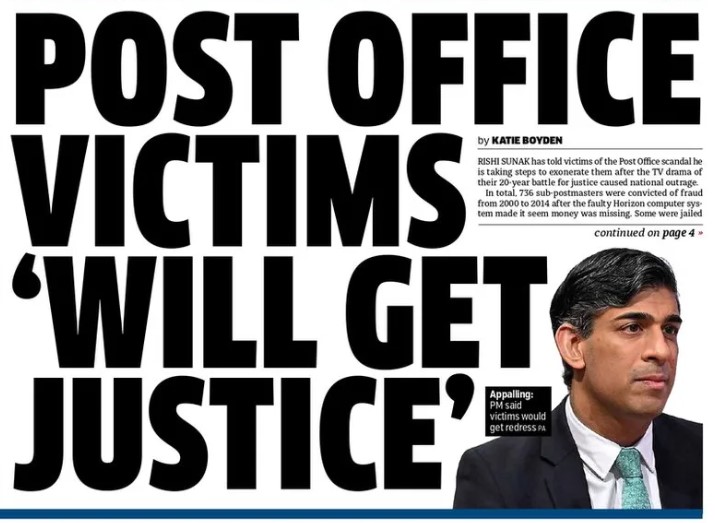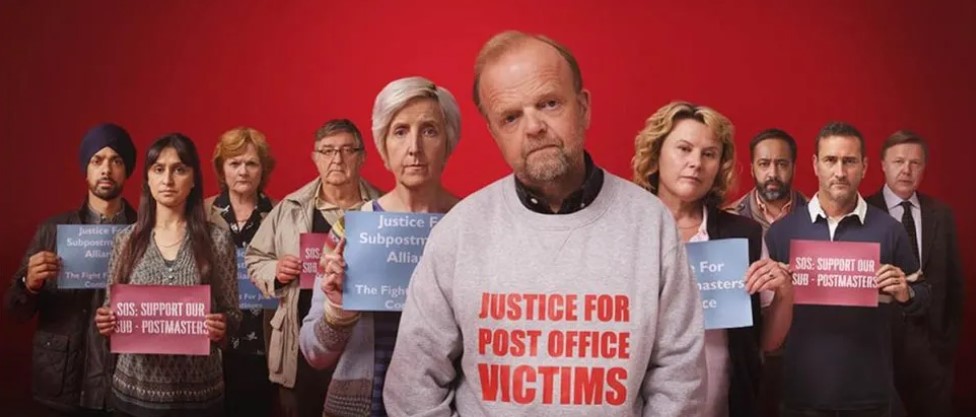By John Pickard
It says something about so-called ‘British Justice’ that it takes a TV mini-series to make a Prime Minister sit up and pay attention to the biggest miscarriage of justice in the UK in modern times. Last week, ITV broadcast a four-part series on the scandal of how the Post Office ruined the lives of hundreds of families.
Since Mr Bates vs The Post Office was aired, there has been an outpouring of outrage among the millions who have seen the series. In just a few days, the online petition to remove the CBE from the one-time head of the Post Office, Paula Vennells, has attracted more than a million signatures.
The four-part series, starring among others, Monica Dolan, Julie Hasmondhalgh, Will Mellor, and Toby Jones as the eponymous Mr Bates, is not just an emotional, and sometimes stressful, rollercoaster to watch, but it is a strident social commentary. It is a programme worthy of the best of Ken Loach, and, not surprisingly, it has become a big political issue. More than anything else, the scandal shows the vast imbalance in the access to ‘justice’ as between the little man and woman – in this case sub-postmasters – and big corporations like The Post Office, which have access to all the legal support they need.
The scandal revolves around the Post Office introducing a computerised accounting system developed by Fujitsu, called ‘Horizon’, but which contained a bug that created artificial deficits in the accounts of Post Office branches. Hundreds of sub-posters were then held responsible for the deficits created by the software, all of them losing their jobs and therefore their livelihoods and personal reputations. Many were prosecuted and scores were sent to prison for ‘fraud’.
They were obliged to make up the ‘deficit’ from their own pockets, which they did, often with help from their wider families. At least four sub-postmasters committed suicide as a result of the scandal. As a result of the TV series being broadcast, another fifty sub-postmasters have come forward to protest their innocence, after having been sacked or prosecuted.
Fujitsu could secretly access Post Office branch accounts
In every single case there were two arguments put to the sub-postmasters. Firstly, they were told that it was “only them” who had a problem, that all the other Post Office branches were having no issues with Horizons, and therefore the fault was theirs alone. Secondly, they were led to believe that their branch account was secure and “no-one else” could access it to introduce errors. Both of these were lies, repeated over and over again. Fujitsu even had a staff of workers accessing branch accounts, without the branches knowing about it. Even when prosecutions began to mount up and the media began to ask questions, Paula Vennell, Post Office boss, reiterated over and over that the Horizon system was “robust”.
Between 1999 and 2015, more than 700 sub-postmasters were prosecuted as a result of glitches in Horizon. It now transpires that even when Horizon was being piloted in the North East of England, that led to anomalies, but instead of these being treated as systemic bugs that required correction, it led to some of the earliest prosecutions.
During the programme, one of the sub-postmasters asks, “What has happened to the money?” Good question. The ‘deficits’ may have been articifical constructs of the Horizons system, but the money that sub-postmasters were intimidated into paying back was real, and it amounted to thousands of pounds, sometimes tens of thousands of pounds out of their pockets. Where did this go? There was only one place it could have gone – into bolstering the profits of the Post Office.

The real Alan Bates was the sub-postmaster at the centre of the campaign to get justice. He told BBC Radio 4’s Today programme last week that the mini-series had made a huge difference. “It’s reignited the whole issue again“, he said. The cast “really managed to get over the real suffering and persecution they’d suffered over the years from Post Office“.
Asked why he thought new cases have come forward since the show aired, Mr Bates said some people “just did not know what had been going on over the years with the campaign“.
“Some people take support from other victims standing up and being identified and that’s given people the confidence to come forward.”
The Post Office is still marking its own homework
In December 2019, the Post Office were finally forced to pay £58mn in compensation for false prosecutions, finally admitting faulty evidence generated by its computer system. The judge at that hearing described the Post Office’s denials about software issues as “institutional obstinacy”. However, after having been awarded costs, the campaign group were only left with £12m – about £20,000 each – after legal costs.
The problem with the current system of compensation is that it is being managed by…The Post Office. They are still marking their own homework. They also have a role in the legal appeals and have fought against some of the conviction appeals that have been brought.
Even now, according to the Guardian, incredibly, the Post Office has been deducting tax from monies given back in compensation. One would have thought that the money that was squeezed out of the savings of sub-postmasters’ families should be returned in full. In what kind of bizaare world is there any tax liability?
Where we are at now, is that there is an offical inquiry dragging on, although the sub-postmasters can see that the whole process is glacially slow. Since the compensation scheme has been dragged out for years, around 60 to 70 claimants have passed away before getting any justice. As Alan Bates told the BBC, “They really must light a fire under their officials to get this sorted.” .
Sunak could resolve the issue in a week
Despite winning their case in 2015, to date, only 93 convictions have been overturned and, of those, only 27 have agreed “full and final settlements”. Now, finally – and only as a result of the public outcry over this TV series – the police are looking into the possibility of criminal actions by people in management of the Post Office, and one would hope, the managers of Fujitsu.
It is coming up to twenty-four years since this scandal began to unfold. If Rishi Sunak was serious about providing justice for these sub-postmasters he would remove the Post Office entirely from the whole compensation process and he would do a number of things immediately:
- Introduce legislation to cut through the tangle of legal obstacles and immediately reverse the convictions of all the sub-postmasters.
- Bring in a panel of outside accountants to check how much money was squeezed out of each sub-postmaster (it will be in court records) and to give full and immediate compensation, with additional payment for the huge stress and anxiety caused.
- Underwrite from the Exchequer the full cost of a reimbursement and compensation package – and it would still only be a fraction of the money thrown at the Tories’ friends during Covid.
- Bring in a panel of lawyers and fraud investigators to investigate the management of the Post Office and Fujitsu and to fast track prosecution of those who lied, covered up, and fraudulently took money from sub-postmasters.
Sunak could resole this issue in a week, if he had the will to do it. As for Keir Starmer, if he had any political nous at all, these are the kind of proposals that he would put forward himself, if nothing else, to put Sunak on the spot. The Tories are looking at a rout at the next general election, but it would do the Labour Party no harm at all to be seen as the champion of the sub-postmasters.
There are two important lessons that we need to take away from this issue and the TV mini-series. The first is that when the the big guys – like the Post Office, or any big company, or the government – take on the little guy, then the latter has no chance of winning alone – the only way to fight is through organisation, through a large campaign or a trade union. As long as sub-postmasters believed what they were told, that they “were the only ones”, they fell into despair. But as a campaign, they were more confident and resilient the longer they went on.
There is no such thing as “British” justice
The second lesson, is that there is no such thing as “British Justice”. An old saying that every working class person has heard, is that there is “one law for the rich and one law for the poor”, and it is absolutely true. While the Post Office, or any big corporation can deploy an army of barristers, the ordinay man and woman cannot afford the cost of lawyers. It took the post-masters years to get legal support and in the end it cost them tens of millions out of their compensation.
We don’t have “British” justice, we have class justice. When a scandal hits the public eye, the response of the Establishment is always to kick the can down the road, to delay any resolution, by starting a ‘public inquiry’ that lasts for years. That is precisely how they have sought to deal with the Post Office scandal first revealed eight years ago.
Leaving aside small and medium-sized businesses, when was the last time a major company was charged with a corporate crime? When was the last time a senior CEO went to jail? To say it is a rarity is the understatement of the year. There was no prosecution of P&O over its criminal disregard of employment law. Has anyone gone to jail for the Grenfell Tower deaths? Will they ever? Well-known High Street Banks have been found guily of money laundering, but they simply buy their way out of prosecution.
If there were any real justice, Lady Mone would be in prison for her procurement of £200m of public money for useless PPE…along with a lot of friends and family of Tories who were shown favouritism in the award of multi-million pound Covid contracts.
The huge public outcry over this TV series is very welcom. But it remains to be seen if it will finally, finally provide justice for sub-postmasters. We sincerely hope it does, but past experiences are not grounds for great optimism.
If you haven’t watched the series yet, then you should do so. It can be found on the ITV catch-up channel, ITVX, or online here. Top picture from ITVX website.




I was with a group of Unison NHS stewards last week and this scandal was a major topic of conversation. It has revealed the rottenness of ‘British justice’.
It was probably only because of the steadfast pursuit of the subject by a lone journalist, Nick Wallis, who began the story in Private |Eye (no-one else was interested), then building to a Radio 4 series 3 years ago, Panorama, then a book, and finally the story broke the surface of our corporate media. The importance of a free press.